Transit

In Ingmar Bergman’s Shame, his 1968 film and second in his Farö trilogy, the writer-director resists gracing the audience with any context, offering no real world anchor to the unnamed civil war closing in on the nearly oblivious idyll of former musicians Eva (Liv Ullmann) and Jan (Max von Sydow). All we know is that enemy forces, from both sides, will sooner than later reach the couple’s island escape, forcing them to finally come to terms with the answers they’ve always obliquely sought in each other. Is he really as selfish as he seems? Is she that basely logical? Does he really not want kids? If not now, then when? What do they see in each other? Even as war and atrocity bring out the empirical in them, they continue to ask questions of each other, falling out of love the more their truer selves are exposed by the horrors they face. At the end of the film, Eva tells Jan about a dream in which she knew there was something she was supposed to remember, but she couldn’t. The audience is left searching for what that was—perhaps an answer to why everything was happening: Why they couldn’t be together, even though they had to, or why they were ever together at all.
In Christian Petzold’s Transit, based on Anna Segher’s WWII-based novel of the same name, the writer-director, like Bergman, strips all context from his story, but not by pulling it out of time. Instead, Petzold’s limned his adaptation in modern technologies and settings—contemporary cars line the streets of today’s Marseille; flat screens hang unimpressively in bars; military police dress in black riot gear, not a swastika in sight—though no one uses a cell phone or a computer, doomed to repeat themselves in bureaucratic offices and waiting in endless lines, all while the enemy, an occupational force, quickly sweeps across France. Odd and surprisingly high-concept, though never pleased with itself, Transit removes context by confusing it, treating its characters as if they’re in a kind of existential wartime limbo, forever fated to keep looking: for escape, for a lost loved one, for some food to eat or a bed to lie in, for a reason to keep enduring. Transit could’ve been a sci-fi drama were its characters ever shown an alternate reality.
Georg (Franz Rogowski) is a German refugee scratching his way through his adopted country, tasked with delivering letters and documents to a writer named Weidel, but, upon arriving, discovers the writer’s committed suicide (leaving an awful mess for the hotel staff). Hearing that the German forces are quickly consuming France, Georg travels to Marseille, where he hopes to make accommodations to leave before the Axis powers arrive, taking with him the identity of Weidel and an omnipresent narrator (Matthias Brandt) who speaks of Dawn of the Dead and Georg’s every emotion even though the narrator never hides that he’s the bartender of the bar Georg silently frequents, piecing together this long forlorn story Georg’s woven for him. Georg isn’t aloof or indifferent or even remotely manipulative, just adrift, and not long after he sets up camp in Marseille, he realizes the beautiful and strange woman who floats through the streets and consulates tapping men on the shoulder is Marie (Paula Beer), Weidel’s widow, looking for her husband. Only Georg knows he’s dead; Georg falls in love with Marie.
Marie’s also shacked up with a doctor, Richard (Godehard Giese), who not only has the right papers to escape before the Germans show up, but wants to take Marie with him. She refuses, of course, because she needs to keep looking for her husband; he needs to go in order to set up a hospital to help with the war effort, but he also doesn’t want to leave this woman with whom he’s smitten. Georg, likewise, befriends the son (Lilien Batman) of a comrade who died during their initial flight to Marseille, a little boy who efficiently projects all father-figure needs onto Georg, devastated when Georg tells the boy that he plans to leave Marseille to once again flee, this time to Mexico. Through patterns and symmetrical sequences that don’t seem that way until they’ve passed, defined by gestures that rhyme with themselves, Petzold establishes the purgatorial world of his characters, people always in between places, always on the move, surviving on the thought of finally finding that which they seek as much as they’re sustained by the act of seeking itself.
-

-

-

-

-

-

-

-

-

-

-

-

-

-

-

-

-

-

-

-

-

-

-

-

-

-

-

-

-

-

-

-

-

-

-

-

-

-

-

-








































